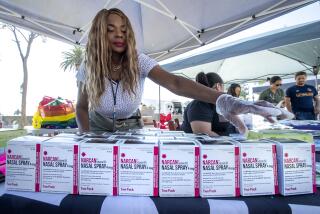Drug War Numbers
- Share via
Jeff Leen’s attempt to separate fact from fiction in the movie “Traffic” presents as its final “fact” a misleading statistic, aimed at showing that the drug war is actually effective and that the movie’s premise of drug war failure itself is false (“Separating Drug-War Facts and Hollywood Fiction in ‘Traffic,’ ” Jan. 12).
While it is true that casual drug use has declined 50% since its peak in 1979-80, what Leen fails to mention is that drug addiction has not declined. At least 6 million people in the U.S. are drug-dependent--and drug-related deaths have doubled since 1989. Heroin and MDMA (methylenedioxymethamphetamine) use by teens more than doubled in the last 10 years. We have doubled our incarceration rate. Drug purity is up, price is down and availability is unchanged.
If this is success, I’d sure hate to see failure.
MAIA SZALAVITZ
New York
*
Leen makes selective use of government statistics to argue that drug czar Barry McCaffrey’s efforts have proven successful.
Ecstasy use has doubled in the past two years. This year’s “Monitoring the Future” report (a national survey of legal and illegal drug use among 50,000 secondary students) found heroin use among high school seniors is at record levels. According to the Centers for Disease Control and Prevention, injection drug use has directly and indirectly accounted for 58% of all AIDS cases among women in the United States. This public health crisis is a direct result of zero tolerance policies that restrict access to clean syringes--policies McCaffrey supports.
It is time for policymakers in Congress to ignore the special interests clamoring for zero tolerance policies and acknowledge the parallels between the drug war and America’s disastrous experiment with alcohol prohibition. Drug laws fuel organized crime and violence while failing miserably at preventing use. Children are especially vulnerable. With no controls for age, the thriving black market is very much youth-oriented.
The drug war is part of the problem, not the solution.
ROBERT SHARPE
Program officer, the Lindesmith
Center-Drug Policy Foundation
Washington


